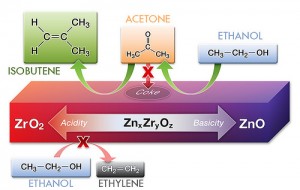A new catalyst for biomass production has been developed by researchers from the Department of Energy’s Pacific Northwest National Laboratory (PNNL) and Washington State University (WSU). These catalysts could turn ethanol into other products by converting it into a chemical called isobutene. This feat can be accomplished in one step, and the process can use water-diluted ethanol rather than purifying it first, saving time and money. The results of the research were published in the July 21, 2011 issue of the Journal of the American Chemical Society.
 “Isobutene is a versatile chemical that could expand the applications for sustainably produced bio-ethanol,” said chemical engineer Yong Wang, who leads research at both PNNL in Richland, Washington and at WSU in Pullman.
“Isobutene is a versatile chemical that could expand the applications for sustainably produced bio-ethanol,” said chemical engineer Yong Wang, who leads research at both PNNL in Richland, Washington and at WSU in Pullman.
The catalyst plays an important role to unlocking renewables to replace fossil fuel in products. For example, the catalytic converter in a car speeds up chemical reactions that break down polluting gases, cleaning up a vehicle’s exhaust. In the process of trying to improve on current catalysts, the team was actually trying to make hydrogen but discovered a significant amount of isobutene, which is better.
Isobutene can be used to make rubber or in cleaning products. In addition, it can be easily converted into jet fuel or octane boosting additives.
The researchers said no one had ever seen a catalyst create isobutene from ethanol in a one-step chemical reaction before, and realized such a catalyst could be important in reducing the cost of biofuels and renewable chemicals. When using a 1:10 ratio of zinc and zirconium, the mixed oxide catalyst could turn more than 83 percent of the ethanol into isobutene.
The research is just beginning and future study will look into optimization to further improve the yield and catalyst life. Wang and his colleagues are also curious to know if they can combine the isobutene catalyst with others to produce different chemicals in one-pot reactions.

